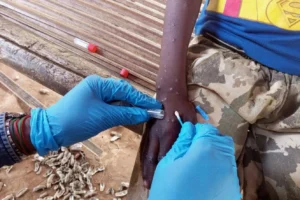A woman trying to start a new life in the West Midlands after fleeing civil war in Ethiopia has described the horror of the conflict and the fear of never seeing her family again.
Lewam Haile left Tigray in 2020 and arrived in the UK the following year.
At one point she crossed the English Channel in a boat and said two people died on the journey.
Separated from her family during the conflict, she said she did not know whether they were alive.
Warning – this article contains distressing content
“I saw a lot of things,” said Ms Haile, 28, who has settled in Walsall.
“Soldiers killing civilians, killing our neighbours, destroying, looting houses… killing in the street. They were shooting, raping.”
After she fled her home, Ms Haile crossed the border into Sudan before travelling to the UK via Turkey, Greece and France.
“I was trying to save my life because I couldn’t get to my family,” she said. “We had been separated because of the war.
“You have to deal with illegal people to cross the borders. You have to deal with troops, the ocean.
“You can imagine how painful and frightful that would be. It was scary and tough. We even lost two friends in the ocean.”
The Ethiopian government began military operations against Tigray’s ruling party – the Tigray People’s Liberation Front – in 2020.
Hundreds of thousands are believed to have been killed and millions displaced.
Cases of Tigrayan women being raped by Ethiopian soldiers and neighbouring Eritrea troops have been documented by the United Nations and human rights organisations.
Forces from Tigray have also been accused of sexually assaulting women in the Amhara region.
A peace deal was signed in November but communications, medicine and food are still limited and the BBC has been told attacks on civilians have continued.
Ms Haile is one of many people in the West Midlands concerned about loved ones in Ethiopia.
Merhawit, who requested her surname was not used, has lived in Birmingham for 10 years. She said not knowing the fate of her loved ones was “hell”.
“Imagine, suddenly, you can’t get through to your family,” she said.
“You keep ringing but the phone is not connected. Every two, three minutes we check our phones hoping for good news and every time we check we see these horrendous atrocities.”
Ms Haile is now waiting for an interview to determine if she can stay in the UK.
She understands her brother and father are still in Tigray but does not know about her mother and two sisters.
“I’m not even sure if they’re alive or not,” she said.
“I can’t go back.”
Source : BBC











